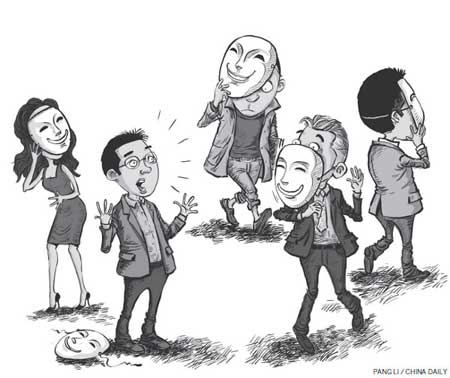当前位置: Language Tips> 双语新闻
Fake vs Frank opinion

|
When showbiz celebrities junk media-speak for a spontaneous burst of plain talk, controversies ensue. But it is better they hold personal beliefs that offend than fake a semblance of propriety that pleases. Chinese filmmaker Feng Xiaogang is known for his uncompromising remarks as well as for his top-grossing movies. Whenever he appears at the annual Shanghai International Film Festival, some newspapers reserve headline space for him, knowing full well that he will "fire at some person or object" and create shock waves throughout the industry or even beyond it. In 2010, Hollywood mogul Harvey Weinstein excused himself after making a brief statement at one of the festival's popular forums, saying he had to catch a flight, and Feng followed up by saying Weinstein was "an outright fraudster". The press later checked Weinstein's itinerary and found him shopping in Shanghai later that day rather than rushing to the airport. Of course, Feng was not aware of that; he was referring to Weinstein's handling of Chinese films in the North American market. The co-founder of Miramax Films and co-chairman of The Weinstein Company countered in a subsequent statement that Feng's film, The Banquet, which he distributed in the United States, was among the most profitable of the Chinese director's movies in that market. In Hollywood, Weinstein is considered to be brash, but compared with Feng he is almost a diplomat. I've heard him in interviews refusing to bad-mouth his Hollywood peers, I mean those who had rubbed him the wrong way or those whose guts he hated. It seems an industry practice that one should not do this kind of thing openly. So, what is your assessment of Feng and his behavior? Is he a loose cannon whose childish recklessness will eventually undo his career, or is he a rare exception in a business where a facade of hypocrisy is to be meticulously maintained even though backstabbing is generally the norm? By attacking Weinstein at such a high-profile event, said some pundits, Feng had cut out the possibility of his movies ever finding their way into wide distribution across the Pacific. Showbiz is not an industry whose practitioners can freely express themselves, at least not those in the big league. They have public personas from which they derive their livelihood. The public has a certain expectation of them, which is usually determined during the molding phase of a career. Feng started out as witty but non-confrontational, a positioning shaped by his early comedies. But as revealed in his two memoirs, he kept his head low and his works inoffensive so that they would have an easier time with both censors and audiences. As his status as the top film comedian of our age solidified, he became more and more vocal. In 2004, he led a relief charity drive for the survivors of the Indian Ocean tsunami. In recent years, he has repeatedly assailed the country's film censorship system. After the release of his latest comedy, Personal Tailor, he threw down the gauntlet to the nation's film critics, whom he charged with deliberately misguiding the public. All these are shortcuts to upsetting different strata of society. Even the charity effort effectively set him against the glitterati he managed to organize because each of them deemed it a snub when they did not get the publicity they sought. I won't go into details about the ruckus with the critics because it involved me as well. Most members of the public tend to view such acts in light of the specific viewpoints being proffered. If they agreed with Feng in his scuffle with the critics, they would say he's a man of integrity and courage, daring to stand up to bullies whom thought they controlled public opinion; if not, the argument would be that he is not gracious towards criticism, which is a blemish for a person of his prominence. However, if we take a step back and scrutinize celebrity behavior, we must determine whether our society benefits from the beau monde that is decorum-abiding and politically correct or one that dares to speak its mind even when it goes against the tide. In other words, are they unelected flag carriers of our tastes and preferences, or are they individuals entitled to their own opinions, some of which have nothing to do with their profession? Coincidentally, Feng was once on the receiving end of a similar volley from a colleague. Actor Sun Haiying time and again lambasted his work for being crass. Sun, who rose to fame after starring in a television drama series about veteran revolutionaries titled Days of Burning Fervor, obviously represented the old establishment in his aesthetics and he attacked low-brow entertainment, official corruption and homosexuality with equal gusto. Feng shot back by saying Sun had had his brain damaged by the burning fervor. A further examination would reveal that Feng was pitted against Sun on only the aesthetic point. In his memoir, he has detailed his positive feelings about Sun's role as a soldier, which reminded him of his own military service. The back and forth between them was conducted through the traditional press. Nowadays one can do this without the filtering of an intermediary by going directly to social media. Either way, it may not be an optimal approach to a rational debate. But it has its own way of bringing issues of gravitas to the surface of simmering sentiments. There's nothing like the exchange of two firebrands, each with tens of millions of followers on a microblog, to spark an intense interest in matters of wider ramification. Had Feng kept quiet, only a few industry insiders would have been informed of the ways Chinese movies are distributed overseas. Had Sun suppressed his aversion to gays, he might have not learned that many of his peers in the entertainment business are among the targets of his moral indignation. And we the public might not have detected a rift in generational perception of the standards for entertainment products. People in showbiz are caught in a quandary. It is generally deemed inappropriate to make public comments on the works of their peers. And other topics could be beyond the reach of their professional expertise. Sure, some stars champion causes close to their hearts or endorse propositions of a charitable nature. But most steer clear of outright controversies. People like Feng Xiaogang have their own logic. They want to carve out more space for their views after they have attained a certain level of professional achievement and social influence. Rather than placing themselves in a straitjacket of public anticipation, they turn their clout into more leeway for what they say and what they do. Feng is a paragon of this art. In his memoirs, he goes to great lengths to offer his take on many of the hottest filmmakers of our era, which is taboo unless it is padded with ingratiating eulogies. He manages to get his points across in a language that seems deferential yet does not drown out the truth. It is a linguistic skill he also employs in his movies, which makes it harder for people from other cultures to fully appreciate them. Even though I do not see eye to eye with Sun Haiying on many of the points he raised, I don't think he should be shamed into silence simply because his perspective would be seen by some as a sign of bigotry. His candor is helpful to the future reconciliation of what are now regarded as moral disparities, just as positive role models can help dispel the clouds of stigma. By Raymond Zhou ( China Daily ) |
娱乐圈所谓的名人们要是愿意和媒体坦率地进行一次谈话,绝对会引来争议。但是比起装作道貌岸然的伪君子,让所有人都满意,人们更愿意看到他们宁愿冒犯所有人,也要坚持自己的信仰。 中国著名电影制作人冯小刚为众人所熟知,他言语犀利,直言不讳,同时他所导的电影票房屡创新高。他只要一出现在上海国际电影节上,某些报纸杂志都会下意识地把头版头条留给他,因为他们知道他一定会“对某人或某事枪林弹雨般地抨击”,震惊全行业,甚至影响其他行业。 2010年,好莱坞电影大亨哈维·韦恩斯坦(Harvey Weinstein)在电影节的热门论坛上三言两语地说了几句,随后借口说自己得去赶飞机,先行离开。冯小刚紧接着便说道韦恩斯坦就是个“不折不扣的伪君子。” 后经媒体查证韦恩斯坦的旅行日程,发现韦恩斯坦当天并没有赶去机场,而是在上海购物。当然,冯小刚当时说那话时并不知情,他所指的韦恩斯坦对在北美市场上映的中国电影没有认真对待。米拉麦克斯电影公司创始人之一兼韦恩斯坦公司董事长的韦恩斯坦随后针对此事回应道,他在美国发行了冯小刚拍摄的电影《夜宴》,这部影片在所有中国导演拍摄的作品中,盈利遥遥领先。 在好莱坞,韦恩斯坦的无礼傲慢人尽皆知,但是和冯小刚相比,他俨然就是个虚伪的政客。我曾在采访节目中听到韦恩斯坦坦言拒绝攻击诽谤业内同行人士,哪怕是那些公然抨击过他的和那些他讨厌的人。似乎这已然成为一种行业规则:人们不应该在公开场合说这类话题。 因此,你会如何评价冯小刚的行为呢?他是个我行我素,自以为是的狂妄之徒吗?他的幼稚鲁莽终将导致其事业毁于一旦吗?或者说他是这个满是尔虞我诈,分秒如履薄冰的行业中,众人皆“假”我独“真”的稀罕物?一些权威人士说,冯小刚在这样万众瞩目的场合毫不客气地给了韦恩斯坦一击,也就埋葬了之后在北美大陆大肆宣传他的电影的可能性。 娱乐圈不是个能够自由说话的地方,至少对那些有头有脸的名人来说不是。他们有着他们赖以生存的公众角色,人们对他们有相应的期望,这种期望在他们事业成型之初就已设定。冯小刚起步之初机智灵活,遇事和缓,这是他早期创作喜剧之时的姿态,但就像他的两部回忆录中所展现的那样,早年他低调做人,所创作品也无所影射意义,一方面是为了电影审片更好通过,另一方面怕受众接受不了。 如今,作为当代最杰出的喜剧演员的他终于不再沉默。2004年,他发起了扶持印度洋海啸风暴中幸存者的救灾慈善活动。近年来,他一再抨击我国的电影审查制度。在发布了他的最新喜剧影片《私人定制》后,他又把矛头指向了国内的影评人,指责他们故意误导公众。 这些都让他“惹恼”了社会不同阶层人士。即使是公益活动,也让所召集的上层人士很恼火,因为他们认为宣传效果未达预期。我不想对此事引起的骚动作过多的叙述,因为我也是当事人之一。 很多旁观者试着用某种特殊的视角来看待这种行为。如果他们支持冯小刚对影评人的指责,那么他们就会说他是个正直勇敢的人,敢于和那些自以为可以掌控观众思想的权贵斗争;如果他们不支持,那么他们就会说他不善于接受批评,这对于这样一个杰出的人来说是一大污点。 然而,如果我们冷静地细细观察名人的所作所为,我们就应该弄明白到底是规规矩矩,政治立场明确的上层人士对社会进步有利?还是那些敢于承受千夫所指而说真话的人?换句话说,所谓的名人,他们是高举大众喜好品味旗帜的先锋呢?还是有权表达自己观点的普通人罢了?甚至是可以表达某些和自己行业并不相关的观点? 很巧的是,曾有一次冯小刚也成了靶子。演员孙海英再三批评他的作品缺乏深度。孙海英因出演革命战争系列电视剧《激情燃烧的岁月》而渐渐走入公众视线,他有着旧时的审美观,坦言攻击低俗娱乐,官员腐败和同性恋。 冯小刚回应他,说道孙海英拍摄《激情燃烧的岁月》烧坏了脑子,而此言之后被澄清只针对孙海英的审美观而言。在他的回忆录中,他对孙海英战士一角的扮演表示认可,说那让他回想起了自己的服兵役生活。 两人之间的口水风波最终在传统媒体的形式中得以平息。现今,人们可以绕过中间媒介,直接在社交媒体上解决这种问题,无论哪种方式,理性地说可能都不是最佳方式。它总能让简单的得体礼貌性问题发展成为个人情绪大爆发。没什么能够像这样的有着数百万微博粉丝的“两支战火”在一系列问题上的“正面交锋”更能激起人们强烈的兴趣了。 如果冯小刚当时没站出来,那么只有业内少部分人士知道中国电影在国外的宣传状况;如果孙海英当时压制住了他对同性恋的厌恶,他可能就不会知道许多娱乐圈内许多同行人原来都是他那次道德指控中的中枪者。而我们作为观众也不会知道新的一代对于娱乐产品已经有了他们新的标准。 娱乐圈内人士正备受煎熬,一般来说,他们不能去评论业内同行的作品,而其他方面的话题又不是他们本业,无法深谈。当然,某些明星根据自己的内心或者本着慈善的出发点来支持或拥护某个事业或建议。但是绝大多数都避开这种显而易见的争议性话题。 像冯小刚这样的人都有着自己的逻辑,他们在已经取得了一定程度的专业成绩和社会影响力之后,想要更多地表达自己的观点,而不是继续穿着大众的期望给他们设计的紧身衣,同时,他们的影响力也为他们的言行举止预留出了更多的自由空间。 冯小刚就能将自身影响力发挥到极致。在他的回忆录中,他评论了很多我们这个时代当红的电影制作人,除非满是逢迎谄媚的赞美词,一般这种做法是触犯禁忌的。而他能够用恭顺的语言把自己真正想表达的内容蕴含其中,这也是他在电影中经常采用的语言技巧,这就让其他文化的人们更难欣赏他所拍的电影。 尽管我对孙海英的许多观点还是不敢苟同,但我不认为仅仅因为某些人会把他的观点当成他顽固不化的话柄,他就应该羞愧得退出荧幕。他的直率有利于在将来调和现有的道德差异,就如正面的榜样能够驱散负面的污点。 (英文:中国日报周黎明 译者 黄曼) 扫一扫,关注微博微信
  相关阅读 |
上一篇 : 欧洲民调:德国女人最滥交
下一篇 : 职场调查:女人为难女人
关注和订阅


电话:8610-84883645
传真:8610-84883500
Email: languagetips@chinadaily.com.cn